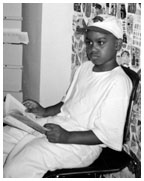
|
June 7, 2006: From the Editor
Dan-el Padilla Peralta ’06 at age 9, reading a favorite book in the Brooklyn shelter where he lived with his family. (Courtesy Dan-el Padilla Peralta ’06) |
Dan-el Padilla Peralta ’06 has been in the news numerous times since his arrival at Princeton almost four years ago: as winner of the Freshman First Honor Prize, for example, and, more recently, of the Daniel M. Sachs Class of 1960 Graduating Scholarship — one of the most prestigious awards given at the University.
Nothing, however, created more of a stir about him than the news that Padilla, a classics major named to be salutatorian at Commencement, is also an illegal immigrant who spent his childhood in poverty, some of it in homeless shelters. He now faces an agonizing dilemma: If he uses his Sachs scholarship to study for a second bachelor’s degree at Worcester College at Oxford University, he will be unable to return legally to the United States — where he has lived since the age of 4 — to see his family for 10 years.
Since arriving on campus, Padilla has made the most of Princeton. He says he has taken 40 classes and completed independent work in both the classics department and the Woodrow Wilson School, writing four junior papers and two theses. But hard work and academic accomplishments could not solve the problem of his status.
Padilla’s predicament was first described in April in The Wall Street Journal by Miriam Jordan; here, beginning on page 28, he tells his own story. He adds a unique voice to the immigration debate — a debate that, he believes, “will be resolved not in people’s minds, but in their hearts.”
According to David Loevner ’76, chairman of the Sachs program, Padilla has received much support from alumni. Padilla has established a Web site with updated information: www.geocities.com/pantagathos.
Associate editor Brett Tomlinson takes up another hot topic with his article on how students and professors approach the controversy over evolution and intelligent design in their classrooms. It’s not the first time Princeton has tried to come to grips with this topic.
In an essay in the winter 2004 issue of the Princeton University Library Chronicle, John Tyler Bonner, an emeritus professor of biology, reported on President James McCosh’s attempt to hire Theodore Gill, a leading zoologist, in 1874. McCosh offered Gill, an evolutionist, the chair of natural history, and Gill accepted.
The trustees, however, refused to confirm the appointment of a Darwinist,
and McCosh then offered the job to a candidate the trustees liked better:
the Rev. George Macloskie, an amateur naturalist and pastor of a Presbyterian
church in Ireland. Bonner quoted Edwin Conklin’s 1948 history of
biology at the University: “[Macloskie] was astonished to receive
the offer of the professorship and doubted his fitness for it. However,
as he humorously confessed, he ‘wanted to see America for a few
years and thought [he] might learn enough natural history on the way over
to keep ahead of the boys.’”
![]()
![]()
Marilyn H. Marks *86
mmarks@princeton.edu

